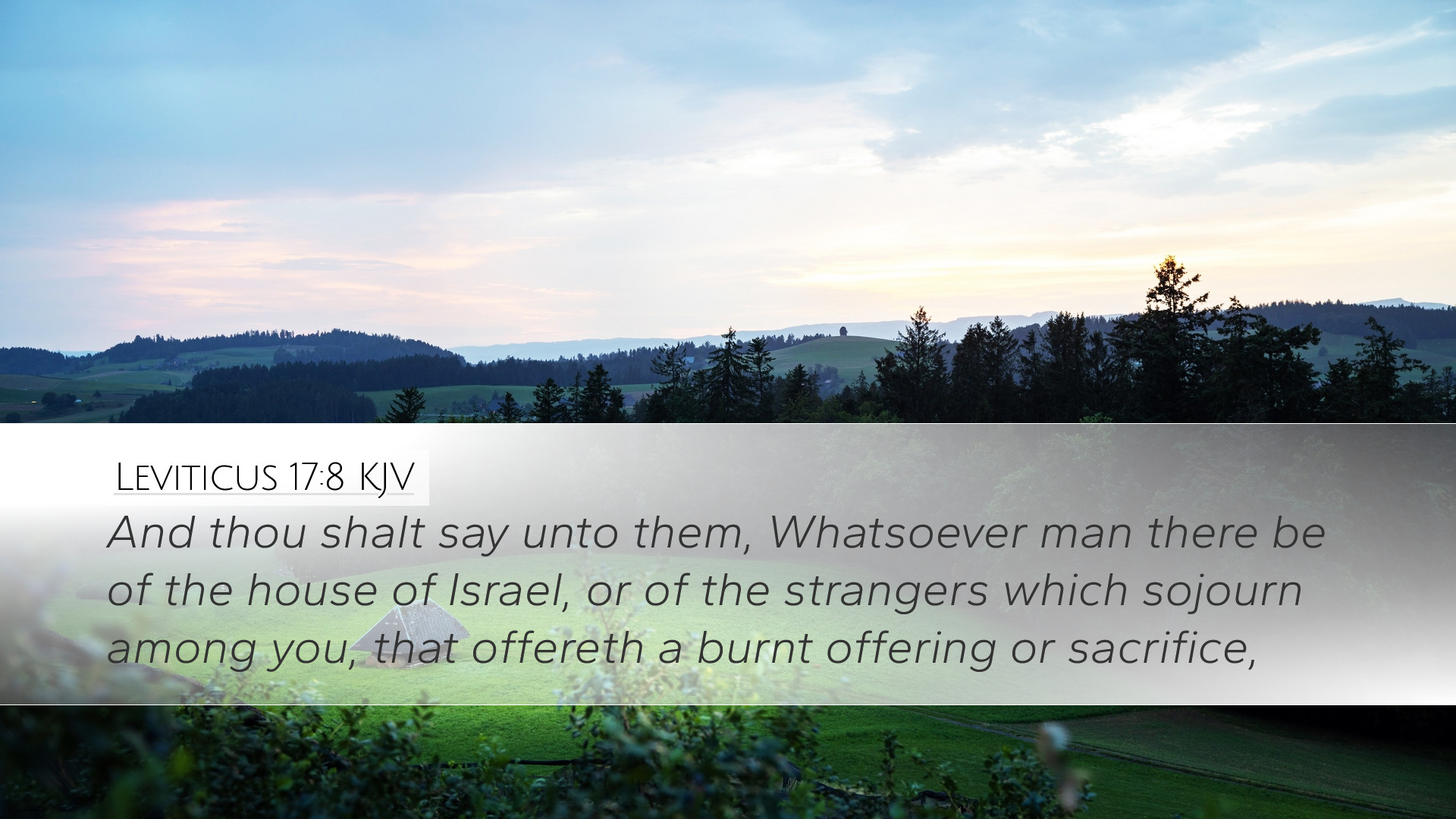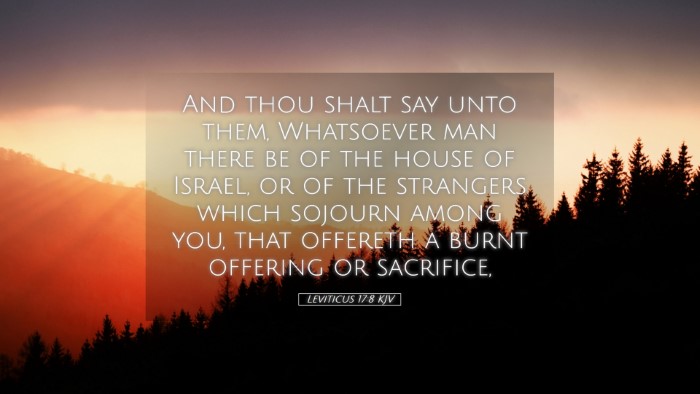Commentary on Leviticus 17:8
Leviticus 17:8 states:
"And thou shalt say unto them, Whatsoever man there be of the house of Israel, or of the strangers which sojourn among you, that offereth a burnt offering or sacrifice,"
This verse constitutes an important directive regarding sacrificial practices among the Israelites and introduces underlying principles relating to worship, community, and divine covenant.
Contextual Overview
Leviticus is positioned within the Torah, a central textual pillar for both Judaism and Christianity. It primarily outlines the laws given to Moses for the Israelites, elucidating their identity as a holy nation. The verses preceding Leviticus 17:8 delve into the appropriate methods of sacrifice and the stipulations associated with offerings, reflecting a broader concern for purity and holiness in worship.
Historical Context
In the ancient Near East, sacrifices were integral to religious life, acting as a means of communion with deities. The Israelites’ rituals were not merely social customs but expressed their unique covenant relationship with Yahweh. Leviticus 17 addresses issues of profane worship, indicating that sacrifices made outside the purview of divinely prescribed methods were unacceptable.
Theological Insights
- Inclusivity of God’s People: The verse emphasizes that God’s commandments extend beyond the Israelites to the "strangers" who dwell among them. This reflects a theme of inclusivity, significant in the New Testament as the Gospel extends to all nations.
- Divine Authority: The stipulation for how sacrifices should be made underscores the authority of God in defining what is acceptable worship. This demands respect for God's prescribed order, a principle echoed throughout the scriptures.
- Sacrifice as a Symbol: The reference to "burnt offerings and sacrifices" serves as a metaphor for total commitment to God. Such offerings symbolize the worshipper's surrender and acknowledgment of divine sovereignty.
- The Role of the Community: By addressing the entire house of Israel and the resident foreigners, the verse indicates that worship was a communal activity, fostering unity and collective adherence to God’s laws.
Commentary from Historical Perspective
Matthew Henry
Matthew Henry emphasizes the necessity of adherence to the appointed way of worship. He argues that this verse encapsulates the seriousness of approaching God. Sacrifices made without proper authority undermine the sanctity of worship, indicating a desire to relate to God outside the covenantal structure He established.
Albert Barnes
According to Albert Barnes, Leviticus 17:8 reiterates the gravity of maintaining the integrity of the sacrificial system. He points out that God’s instructions serve to safeguard the worshippers from misunderstandings of holiness. Barnes also highlights the distinction God makes between His people and the surrounding nations, underlining the responsibilities that arise from His chosen status.
Adam Clarke
Adam Clarke offers insights into the socio-relational dynamics among the Israelites and the foreigners (strangers). Clarke notes that these guidelines fostered a sense of community cohesion, ensuring that all who wished to worship had clear directives. His commentary stresses the importance of acknowledging God’s explicit mandates in spiritual practices as a form of discipline and reverence.
Practical Applications
For pastors, students, theologians, and Bible scholars, this passage invites rigorous examination of worship practices and their theological implications. Below are a few applications derived from the verse:
- Restoration of Worship: Encourage communities to return to biblically defined worship practices, emphasizing God’s holiness and sovereignty in their approach to spiritual matters.
- Engagement of All Worshippers: Ensure that church practices are inclusive, inviting participation from various groups, much like the strangers among the Israelites, fostering a diverse worshiping community.
- Educational Emphasis on Sacrifice: Conduct teachings that delve into the significance of sacrifice, drawing parallels between the Old Testament practices and the ultimate sacrifice of Christ, highlighting themes of redemption and commitment.
- Reflection on Community Identity: Cultivate a strong identity within congregations that reminds members they are part of a chosen people, tasked with reflecting God’s character within their communities.
Conclusion
Leviticus 17:8 serves not only as a historical directive but also as an invitation to profound theological reflection. The interplay between God’s commands and the people’s response is foundational in navigating the spiritual landscape today. Drawing from the insights of Matthew Henry, Albert Barnes, and Adam Clarke allows a richer understanding of the implications this verse holds for contemporary worship practices and the communal identity of believers.


